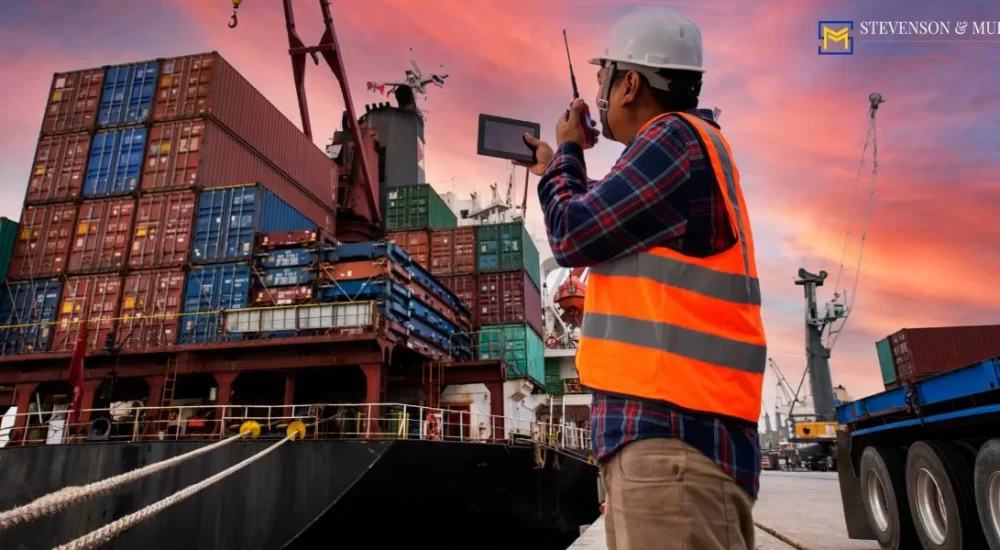|
|
Last Modified on May 14, 2024
Maritime work is vital to the country’s economy, particularly in the offshore oil and gas industry. The industry employs nearly 650,000 Americans in various jobs across every state in the union. It is such a vast and significant industry that accidents are bound to happen, and those accidents can lead to injuries, delays, loss of cargo, and even deaths in certain situations. The maritime industry remains important to the country, and understanding the common causes of maritime accidents in Texas can help prevent more in the future.
Common Causes of Maritime Accidents in Texas
Working on a ship or a dock in a Texas port can be a rewarding, labor-intensive job with its own positives and negatives. The maritime industry encompasses many different kinds of activities, from cargo transportation to vessel maintenance and construction. That means that there are a lot of different ways that accidents can happen, so there are also a lot of different kinds of accidents to prevent.
If you are injured in a maritime accident, you should reach out to a maritime accident lawyer and see if you are eligible to receive compensatory damages. Maritime accidents can be quite severe and lead to serious financial, physical, or social losses. Here are some of the more common causes of maritime accidents in Texas:
- Exhaustion: Maritime workers can often work long hours, which can lead to persistent feelings of exhaustion. Every person needs sleep and rest to restore their body to optimum efficiency. Failure to do that can cause inadvertent negligence, a lack of focus, and overall drowsiness. All that can lead to accidents, from a ship grounding to a misuse of a crane and everything in between.
- Raging Waters: The sea can be tough to tame. A bad storm, a hurricane, a tsunami, or even just exceptionally rough waters can make things worse for a maritime crew and lead to accidents. However, just because the ocean was particularly in bad form, it does not automatically absolve the rest of the crew from responsibility when an accident does happen. An investigation will likely be made and determine fault if there is fault to be had.
- Inclement Weather: There is a very big difference between weather on land and weather at sea. Weather at sea can be harsh, unpredictable, and a considerable cause of maritime accidents. For starters, the winds can blow so strong that they produce waves in the ocean, which can damage ships if they are too big or too fast. Rogue waves are especially dangerous, as they are considerably larger and can often appear seemingly out of nowhere.Bad weather can cause cargo to shift and equipment to fail, and it can hurl maritime workers off their vessels with tremendous force.
- Equipment Failure: Like any job, maritime work depends largely on equipment that is correctly maintained and up to date. This includes instruments, vehicles, lifeboats, navigation equipment, and so much more. If any of this equipment fails or is faulty to begin with, it can seriously impede the success of a voyage or even injure workers who are unaware of the equipment problems.
FAQs
Q: What Is the Most Common Type of Accident at Sea?
A: The most common type of accident at sea is a man overboard situation. It’s also one of the most dangerous situations that can occur on a seafaring vessel. People get knocked overboard for all sorts of reasons, from heavy winds to unexpected swells to slipping on a wet deck. Most seafarers are well-trained on how to handle a man overboard, but that doesn’t make the incident any less frightening, unpredictable, or easier to handle.
Q: What Is the Primary Cause of Accidents and Disasters at Sea?
A: According to a 2022 study by the National Library of Medicine, the primary cause of accidents and disasters at sea was determined to be sinking, which accounted for 63.5% of the 52 accidents that were included in the study. When a ship is sinking, it puts a great deal of stress, fear, and unpredictability on the surviving crew. Things don’t happen the way they are supposed to, other mistakes are made, and everything just gets worse because people are fearing for their lives.
Q: What Is the Most Common Cause of Maritime Collisions?
A: The most common cause of maritime collisions in the United States is simple human error. People tend to make mistakes when they are not paying attention to their surroundings. In a maritime collision, failure to pay attention to what you are doing can result in significant property damage, serious injuries, and even loss of life. It is vitally important that you constantly stay focused and pay attention to everything around you when you are driving a boat.
Q: What Is the Number One Cause of Death at Sea?
A: According to a 2019 study, the leading cause of death at sea was cardiac arrest. Everyone is at some level of risk of suffering a heart attack, even at sea. Over 25% of ship officers are over the age of 50, and 50% of officers are over the age of 40. The risk factors of working on a maritime vessel all increase the chances of a heart attack, such as hypothermia, fall trauma, metabolic changes, respiratory problems, and electrocution.
Reach Out to an Experienced Maritime Accident Lawyer Today
Working in the maritime industry opens one up to a great deal of stress, complications, and unpredictability. Accidents happen all the time and depending on the situation, you may be able to hold someone accountable for your accident and seek compensatory damages. In these situations, it is important that you take the proper steps to protect yourself.
At Stevenson & Murray, we are prepared to help you develop your case and investigate your maritime accident to determine exactly who was at fault for it. We can help you deal with insurance companies and represent your interests throughout the process. Contact us to find out today how we can assist you with the next step of your case.






